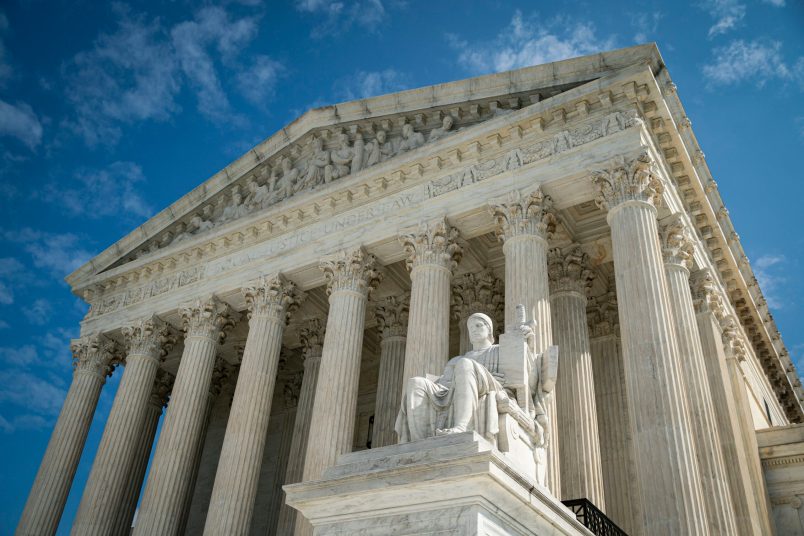The Supreme Court rejected on Thursday Texas’ challenge to the Affordable Care Act, in a 7-2 decision. The majority opinion, written by Justice Stephen Breyer, said that the challengers had not met the procedural threshold to bring the case.
The Supreme Court’s refusal to dismantle the 2010 law marks the third time that the Affordable Care Act has survived a major Supreme Court challenge.
Only Justices Samuel Alito and Neil Gorsuch dissented in the case decided Thursday. Justice Clarence Thomas wrote a concurring opinion.
This case was brought by attorneys general from Texas and several other red states. They argued that when Congress, via the 2017 Republican tax cut bill, zeroed out the law’s individual mandate, it rendered the entire law unconstitutional. Under President Trump, the Justice Department supported this sweeping attack on the law.
A conservative district judge in Texas sided with the challengers, while an appeals court essentially punted on the case. Still, Democratic attorneys general and the House of Representatives — which by then was controlled by Democrats — asked the Supreme Court to intervene, which it did by deciding to review the case last year.
However, Justice Ruth Bader Ginsburg’s death in September added some drama in the case. Chief Justice John Roberts was expected to vote to uphold the law — as he did during the previous two major ACA challenges — but, with Ginsburg now replaced by Trump appointee Justice Amy Coney Barrett, it was not clear whether there would be another vote from the conservative bloc to join the liberals in siding with the law.
However, at oral arguments last November, key justices gave hints that they were not likely to strike down the law in its entirety. Ultimately, two of the three Trump appointees on the court, Barrett and Brett Kavanaugh, joined Breyer’s opinion, as did the chief justice.
Compared to the previous two Obamacare challenges that landed before the Supreme Court, the case filed in 2017 was far more fringe, and was viewed skeptically even by conservatives who supported earlier lawsuits to dismantle the law.
The Supreme Court concluded that the challengers had failed “to show a concrete, particularized injury fairly traceable” to the federal government’s continued enforcement of the law. To prove that they had “standing,” the term for meeting that procedural threshold, the Republican states had pointed to the supposedly increasing costs they were facing because of those who, due to the ACA’s insurance requirements, were enrolling in state insurance programs. The GOP states had also claimed that the administrative costs associated with the individual mandate also gave them standing.
The Supreme Court rejected those arguments, as well as the standing arguments brought by two individuals who joined the red states in challenging Obamacare.
“Unsurprisingly, the States have not demonstrated that an unenforceable mandate will cause their residents to enroll in valuable benefits programs that they would otherwise forgo,” Breyer wrote.
Because the challengers had not overcome that procedural bar, the Court was not weighing in on the constitutional and other legal questions the case presented, Breyer wrote.
The challengers’ standing arguments couldn’t even convince Thomas, who in the two previous Obamacare cases before the Supreme Court voted in the minority to strike down the law.
“But, whatever the Act’s dubious history in this Court, we must assess the current suit on its own terms. And, here, there is a fundamental problem with the arguments advanced by the plaintiffs in attacking the Act—they have not identified any unlawful action that has injured them,” Thomas wrote. “Today’s result is thus not the consequence of the Court once again rescuing the Act, but rather of us adjudicating the particular claims the plaintiffs chose to bring.”
Thomas, in his concurrence, praised some of aspects of the cranky dissent written by Alito and joined by Gorsuch. In particular, Clarence agreed with Alito’s griping about how Obamacare defenders in the last two cases had painted the individual mandated as deeply embedded in the law, and in the current case, were arguing that the law could survive without the mandate’s penalty.
Where Alito and Gorsuch went farther than Thomas, however, was in arguing that this case did warrant the Supreme Court stepping in and throwing out the entire law.
“Today’s decision is the third installment in our epic Affordable Care Act trilogy, and it follows the same pattern as installments one and two,” Alito wrote.“In all three episodes, with the Affordable Care Act facing a serious threat, the Court has pulled off an improbable rescue.”
Read the opinions below:



